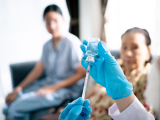Editor's note: Because of a technical problem, this story was not published until Mar 27.
Mar 26, 2007 (CIDRAP News) – The World Health Organization (WHO) opened a meeting with Asian health officials in Jakarta today to hear their concerns about access to H5N1 influenza vaccines and discuss solutions that might allow researchers to regain unrestricted access to H5N1 samples.
Indonesia brought the issue to the forefront in February when it announced it would send no more H5N1 samples to the WHO until it received assurances that the strains would not be used by private companies to make vaccines that the country couldn't afford.
Though some countries and health officials support Indonesia's use of the virus samples as leverage to gain access to H5N1 vaccines, others have charged that Indonesia is impeding global efforts to chart the spread of the disease, track genetic mutations, and develop new vaccines.
In his opening remarks at the 2-day conference today, which were e-mailed to journalists, David Heymann, the WHO's acting director-general for communicable diseases, said responsible virus sharing requires both unrestricted access to novel influenza viruses and equitable access to pandemic vaccines that result from the sharing.
Heymann defended the WHO's history of coordinating vaccine development and production on behalf of developing nations. In 1997 the WHO responded to a major meningitis outbreak in sub-Saharan Africa by mobilizing the production and distribution of 3 million doses of vaccine.
"To date, more than 20 million doses of meningococcal vaccine have been channeled through the International Coordinating Group mechanism, and improvements in surveillance have occurred because the prospect of having access to vaccine is a compelling incentive to report cases," Heymann said. A similar mechanism was recently established to coordinate stockpiling and distribution of yellow fever vaccine for Latin America and Africa, he added.
The Jakarta meeting will allow the WHO and the 18 Asian nations to discuss not only virus-sharing proposals that will be debated at the World Health Assembly in May, but also obligations that countries have under the revised International Health Regulations, which take effect in June, Heymann said.
He predicted the meeting would bring discussion of the advantages and disadvantages of material-transfer agreements and other virus-sharing mechanisms, "and it will become clear that most of these mechanisms would impede rather than facilitate the world's risk assessment and preparedness for an influenza pandemic."
Indonesian Health Minister Siti Fadilah Supari has asked the WHO for a binding guarantee that H5N1 samples won't be used to develop commercial vaccines priced out of the country's reach. Indonesia also signed a memorandum of understanding with US vaccine producer Baxter International that laid the groundwork for future collaborations or supply agreements.
At the meeting today, Supari told reporters that if Indonesia had its own WHO collaborating center and vaccine factory, it would not need to send viruses outside the country, the Associated Press reported.
The WHO said last week that projects to establish flu-vaccine manufacturing capacities in up to six developing countries—four in Asia and two in Latin America—were "in the final stage of approval." Japan and the United States have provided $18 million toward the effort, the WHO said. But Heymann's prepared speech did not mention those projects.
US Health and Human Services Secretary Mike Leavitt said in a Mar 23 press release that the United States provided $10 million toward the WHO's vaccine supply expansion plan. "Responding to a pandemic demands the cooperation of the world community, as no nation can go it alone. If a country is to protect its own people, it must work together with other nations to protect the people of the world," he said.
Heymann said solutions for improving H5N1 vaccine access in developing countries will require both short- and long-term measures, which could include:
- National stockpiles
- Virtual stockpiles—certain amounts of pandemic vaccine that producers would set aside for the WHO to buy for developing countries
- Fill-and-finish operations that allow developing countries to package bulk vaccine from manufacturers
- Technology-transfer agreements like those used for the conjugate meningitis vaccine, which would allow developing countries to add to the world's flu vaccine supply.
See also:
Mar 22 CIDRAP News story "WHO: Six developing countries may get flu vaccine plants"
Mar 23 HHS press release
http://www.hhs.gov/news/press/2007pres/03/20070323e.html

















